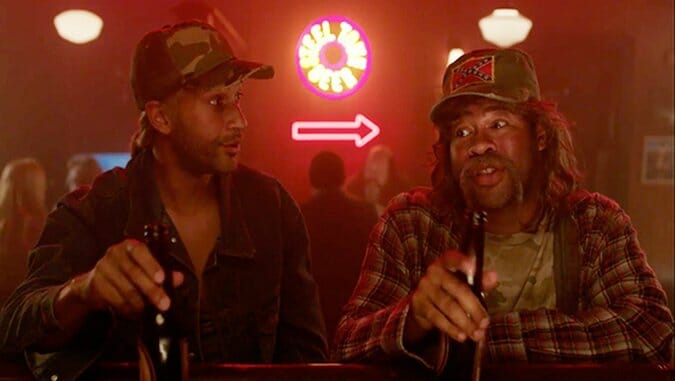Key & Peele: Season 4 Premiere
(Episode 4.01)

We should go ahead and establish that Key & Peele is the best sketch comedy program on television. It’s damn well near irrefutable, with its tight writing, glossy presentation, and outstanding performances that have pleased audiences and critics alike, not to mention its stars won a Peabody Award earlier this year. But even more than its comedic chops, and surpassing its stunning presentation or guest appearances, is the extreme relevancy that it offers. With a knack for poking fun at the constructions of modern life and culture, Jordan Peele and Keegan-Michael Key’s sketch comedy occasionally reflects, in its own, subdued way, a didacticism popularized by fiery comedians like Pryor, Carlin and Chapelle. It’s mellowed, for sure, but the political slant that hits a chord with Key & Peele’s audience base—and makes it essential viewing—is back in full-swing in season four’s premiere episode.
Anticipation for the fourth season was heightened when Comedy Central uploaded two teasers from the premiere earlier this month. There’s “Gay Wedding Advice,” for starters, in which Peele’s character invites Gary (Key), a homosexual coworker, before his family to discuss “gay wedding” etiquette (because, as Peele’s character explains, “Cousin Delroy is getting married…to a man…which is crazy!). The bit offers particularly outrageous writing, with marvelously cringeworthy and non-PC questions regarding dress codes, fake priests and presents (“Where do you get the Euros to buy gay gifts?”). There are many famous faces as family members, as well, including Romany Malco of The 40 Year Old Virgin and The Wire’s Lance Riddick.
The latter teaser, “Alien Imposters,” follows Key and Peele’s characters as they navigate a post-alien abduction cityscape. Toting large guns as defense against killer extraterrestrials, the pair are greeted by several “survivors” whose statuses as human or predator are determined using questions that hit on racial prejudices or stereotypes. “What do you think of the police?” Key’s character calls out to a black man. “I loved their third album!” he responds. The men aim their weapons at the man, knowing unequivocally that he is an alien. It’s a sketch that serves punchline after punchline (and ends with a comically brutal twist).
-

-

-

-

-

-

-

-

-

-

-

-

-

-

-

-

-

-

-

-

-

-

-

-

-

-

-

-

-

-

-

-

-

-

-

-

-

-

-

-








































